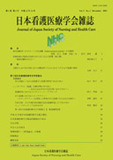Japanese
English
- 有料閲覧
- Abstract 文献概要
- 参考文献 Reference
- サイト内被引用 Cited by
要旨
この研究は、痴呆高齢者へのロボット介在活動(robot-assisted activity:RAA)の効果を、唾液中の3-methoxy-4-hydroxyphenylglycol(MHPG)、3-methoxy-4-hydroxyphenylacetic acid(HVA)、分泌型免疫グロブリンA(s-IgA)の各濃度と、改訂長谷川式簡易知能評価スケール(HDS-R)、行動障害による介護負担評価スケール(DBD)、N式老年者日常生活動作評価尺度(N-ADL)から明らかにすることを試みた。介護老人保健施設に入所している20人の痴呆高齢者が、ペットロボットとしてAIBO(SONY ERS-210)を用いた30分間のRAAを週3回、4週間継続して行った。そして、1週目に行った3回と4週後の最終回の活動前後に唾液を採取し、分析した。また、RAAを始める前と4週後のHDS-R、DBD、N-ADLの得点の変化を比較した。その結果、初回のRAAでは心身の活性化がもたらされ、特にアルツハイマー型痴呆高齢者ではHVA濃度が有意に上昇したものの、長期的な効果は認められなかった。しかし、DBDとN-ADLについては、参加者の40〜50%に改善がみられた。本研究では、RAAの短期的な有効性が示唆されたが、今後は長期的な効果を得るための方法について検討が必要である。
Abstract
This study clarified the effects of RAA(robot-assisted activity)on senior citizens with dementia. The concentrations of 3-methoxy-4-hydroxyphenylglycol(MHPG), 3-methoxy-4-hydroxyphenylacetic acid(HVA), and secretory immunoglobulin A(s-IgA)in saliva were used as psychophysiological index. As behavioral and dementia measures, HDS-R(Revised version of Hasegawa's Dementia Scale), DBD(Dementia Behavior Disturbance), and N-ADL(N-Activities of Daily Living Scale)were used. Twenty senior citizens who entered a healthcare facility for the elderly participated in this experiment. They engaged in RAA three days a week for four weeks. Each session was 30 minutes with AIBO, a pet robot (SONY ERS-210). Saliva samples of participants were collected before each session. In addition, HDS-R, DBD and N-ADL scores from before and after the four week course were compared. As a result, short-term effects of RAA were suggested, specifically, HVA concentrations increased significantly in one senior citizen with Alzheimer's disease, but long-term effects were not seen. Improvement in behavioral evaluations were seen in 40-50% of the participants on DBD and N-ADL scores. Development of an approach to investigate the long-term effects of RAA is needed.
Copyright © 2003, Japan Society of Nursing and Health Care All rights reserved.


